Five months ago, my friend Beth and I in Valencia sunned ourselves on a beach, wandered through endless stalls of fruits, vegetables, and cheeses at a covered market, and ambled through the narrow streets. This past week, I’ve sunk into the couch watching the troubling news from Valencia, two hours from Madrid by train, where at least 217 people have died, and hundreds are missing in a devasting flood. In the United States, election predictions and campaign speeches roil the airwaves. I should get off my duff and do something.
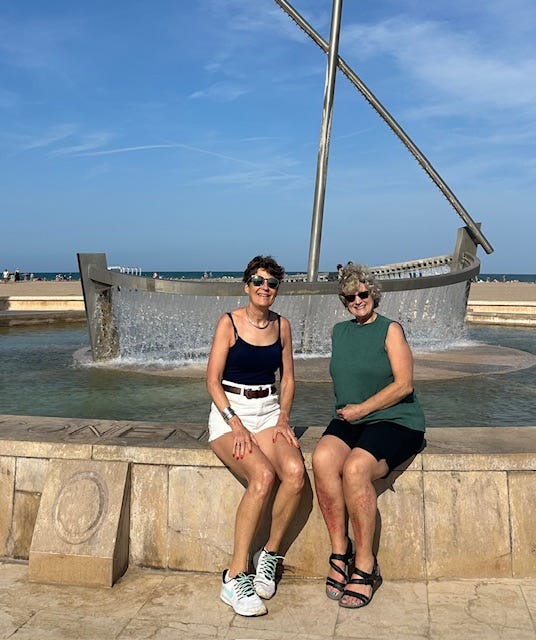
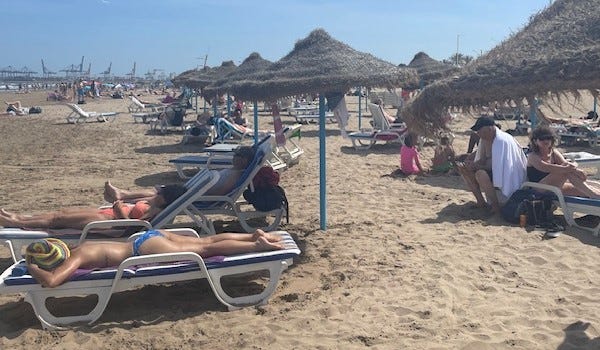
Heavy rains pummeled the Valencia region beginning on October 29. The storms centered over the Magro and Turia river basins and in the Poyo riverbed. The water rose quickly and flowed over the riverbanks through city streets, overwhelming residents. A year’s worth of rain fell in eight hours. The storm brought down bridges, caked towns in mud and debris, trapped cars in tunnels and underground parking lots, and invaded residents’ homes and shops. Streets became rivers. Lakes submerged neighborhoods. The deluge cut off access to food, water, and electricity. It was one of the worst floods in Europe this century.

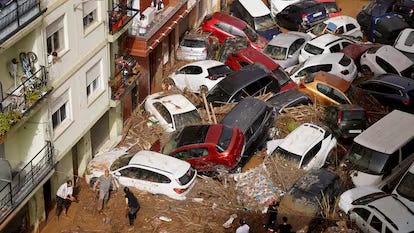
This event far exceeded the customary autumn storms that bring flooding to the coast. Those Valencians who remember the flood in 1957 when the banks of the Turia River collapsed, water gushed into the city, and 81 people perished, said this one was far worse. After that flood, the government diverted the Turia River. That act 67 years ago saved many lives in last week’s disaster.
I wonder what Valencia will look like the next time I stroll through its streets while soaking up the sun’s rays and salty air. In past visits, I’ve admired the statues and fountains in parks and plazas. With this flood, I see their symbolism and irony. They highlight Valencia’s reliance on and gratitude for the surrounding rivers and sea. One marble statue represents Triton, a Greek mythological merman and demigod of the sea. He was the son of the god of the ocean, Poseidon. Triton’s upper body is of a man and the lower the tail of a fish. As the moment called for, he blew a seashell to calm or elevate the sea. Where was he this time?
The Fountain of Turia in the city’s historical district represents the river of the same name and the fertility it brings to the nearby agricultural land. At the center reclines a man with a cornucopia at his side. Eight naked female figures of adolescents surround him. Each carries a farmer’s clay pot of water. These symbolize the eight canals that bring water to the fields. This time, rivers drowned people and their crops.
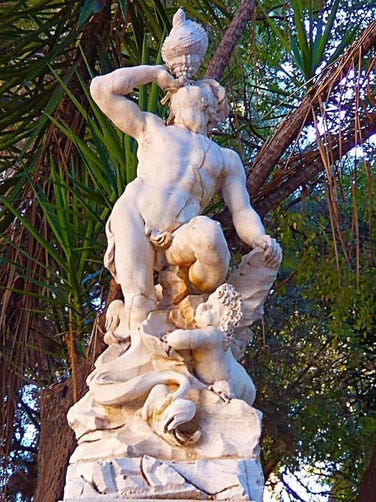
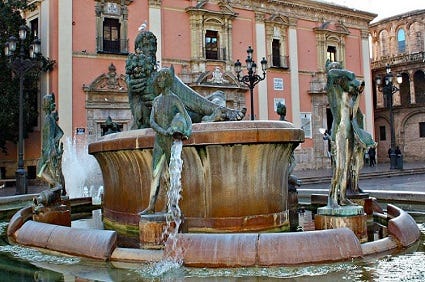
Watching the Spanish news, I see Spain is not immune from one political party blaming another for natural disasters. Or anything else. Valencians and others across the country have accused the region’s governor Carlos Mazon, from the conservative Populist Party, for failing to issue timely warnings about the storm’s potential dangers. The government sent text messages about the storm eight hours after the first reports of floods. They went out ten hours after the national meteorological society warned about “extreme danger” in the region. By 8:00 at night when the storm struck, locals were driving home from work, buying groceries, meeting friends at a bar, or emerging from an underground parking lot after picking up a few items at the store. The inundation trapped them on the spot, killing hundreds.
The country’s prime minister, Pedro Sánchez, from the Socialist party, has also been criticized for lagging to marshal financial resources and rescue and emergency workers. He asked for assistance four days after the flooding began. However, he could not do this without the invitation and approval from Mazon’s regional government. The prime minister’s government has said authorities in Valencia held the responsibility for protecting its residents.
During this vacuum, thousands of volunteers from around the country equipped with shovels, brooms, buckets, gloves, and masks to dig in and clean up arrived at the request of Mazon’s authorities.

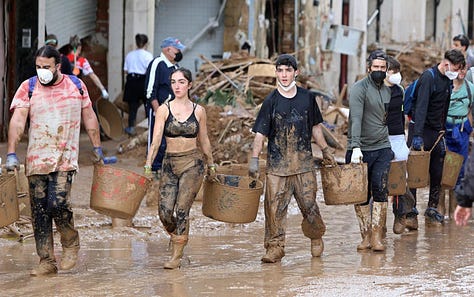
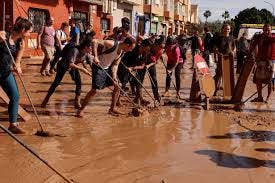
Spain’s King Felipe VI and Queen Letizia didn’t come out clean either. As they toured the streets on November 3, Valencians slung mud and curses at them for the tardy national response. His visit angered them. While well-intentioned, it’s said it served as a distraction of attention and resources. Despite splotches of mud sullying his clothes, angry words hurled from locals, and fists shaken in his face, he stuck around to wander among the rubble and to listen to residents’ complaints.

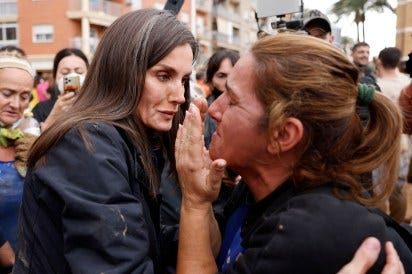
I observe from the couch this turmoil taking place two hours away in Valencia and across the ocean in my home country. A pit in my stomach grinds and my heart hangs low seeing images of Valencians who have lost everything they own and must start over. I have an inkling of that devastation. Fabio and I experienced a similar tragedy when a moving and storage company absconded with all our household and personal possessions. We lost everything. As I watch the election predictions, I strive to push away fear and doom. I can’t even find a bright side if my preferred candidate doesn’t win.
Sitting on my duff far away from either place, the only thing I do is send money for the cause. It helps. It makes me feel better. But it’s not enough.
How are you coping with the uncertainty about the elections? Doom scrolling? Going for a walk? Ignoring the media? Meditating?





Thank you for this difficult but very powerful post Andrea. The recent flooding in both the US and Spain is unimaginable even when seeing the pictures. As far as the US election goes, I am avoiding most of the media and predictions at this point, and have a weekly virtual group mediation session at 7:00 pm tonight which arrives with perfect timing! I’m also reading a very good detective novel which is a welcome distraction….
I believe that it was Martin Luther King who said that despair is not productive, so my primary goal, regardless of the election outcome, is to not panic and not despair. To keep living the best life we can, do what we can, and know that we’ve done that. Your monetary contributions are enough right now, Andrea - please don’t despair.
Thank you for this post - as hard as it is to read and as hard as it must have been to write. My family was lucky to just miss total devastation from Hurricane Helene a few months ago - but if they had been any closer ( a few feet, in some cases), they would not have made it. A reminder at how incredibly fragile our existence is. And yet, how incredibly resilient people are.